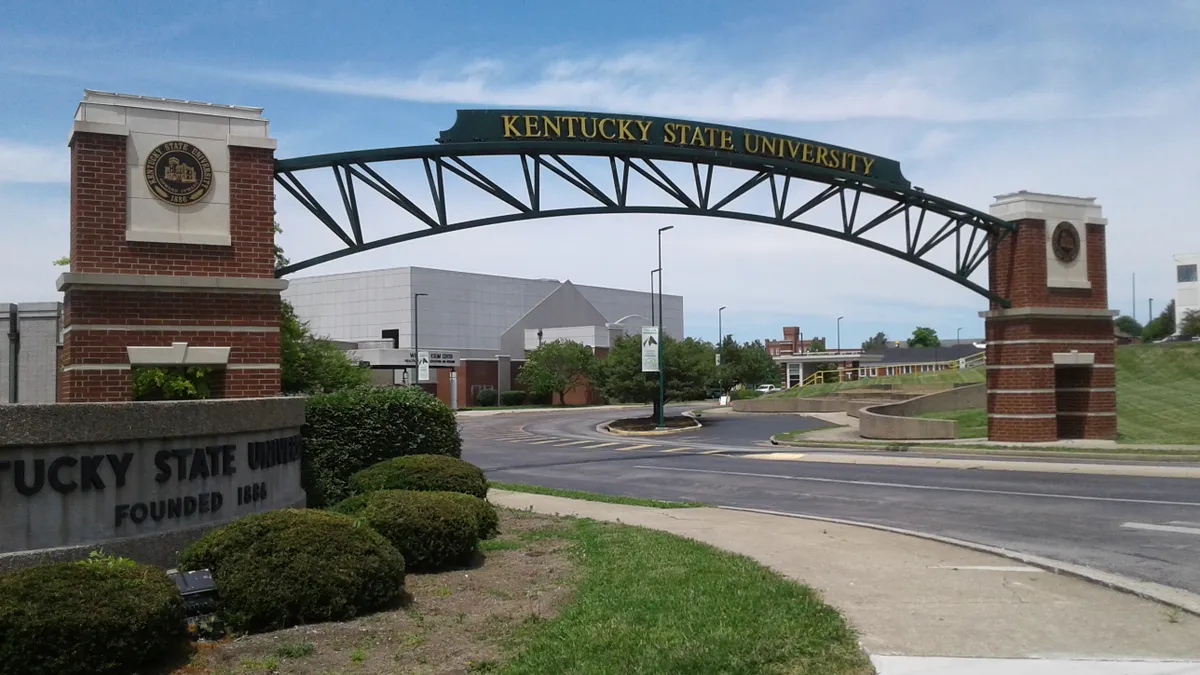UPDATE: Oct. 20, 2021: Kentucky State University is asking state lawmakers for $23 million to plug budget holes, plus an additional $1 million annually until 2024, the Lexington Herald-Leader reported. The historically Black college's governing board agreed Tuesday to the request, which will cover a $15 million shortfall from unpaid expenses as well as a projected gap of $7 million for the 2022 fiscal year.
The university's major budget problems stem from "poor leadership" over its finances that did not follow institutional policies, according to an official from the state's Council on Postsecondary Education. The organization found differences in the university's actual finances and what it reported between 2015 and 2020.
Dive Brief:
- Kentucky State University, a historically Black institution in Frankfort, will need emergency funds from the state to stay open for the rest of the fiscal year, a school official told lawmakers during a budget hearing last week.
- University staff members alerted its governing board this summer that it was facing a budget shortfall of around $15 million. Kentucky State's new vice president for finance and administration, Gregory Rush, suggested financial missteps under the school's previous leadership led to the issue.
- The school has taken steps to gain better financial footing, including employee separations and freezes on hiring and nonessential travel. Rush said the school will make it to January but will need additional state support to continue past April.
Dive Insight:
Kentucky State's challenges are coming to a head at a time of high concern over finances, state support and management at several HBCUs across the South. In Tennessee earlier this year, a legislative analysis found the state might not have matched federal grants to Tennessee State University for decades, meaning the university may have missed out on up to $544 million in required funding.
This summer, South Carolina State University fired President James Clark amid concerns he hadn't improved enrollment. Clark was hired a few years after South Carolina State requested a $13 million bailout from the state legislature in 2014, only to have state leaders counter with criticism and a $6 million loan.
Now, lawmakers in Kentucky are chiding university leaders a few months after Kentucky State's president, M. Christopher Brown II, abruptly resigned in July amid concerns over the school's budget. Soon after, Kentucky Gov. Andy Beshear signed an executive order instructing the state's Council on Postsecondary Education to review the university's finances.
It is the second time Brown has stepped down as president of an HBCU over such issues. In 2013, he left the top post at Alcorn State University, in Mississippi, during an investigation into the school's purchasing decisions, The Associated Press reported at the time.
Along with an interim president, Kentucky State has some new financial team members.
Rush told lawmakers the school's financial troubles stemmed from several causes, including a lack of spending control and not ensuring students were paying their bills.
The university in recent years has allocated resources toward initiatives such as enhanced advising and faculty recruitment, which have improved student outcomes, Rush said.
"We've had some significant successes, but the money was not there to do the initiatives, to do these projects," Rush said.
The problem came to a head around July, when the school didn't have enough cash and accessible state appropriations to cover roughly $2.5 million for payroll and $4 million owed to vendors.
Lawmakers chided the university during the budget meeting.
"I'm astounded at what appears to me to be a total lack of oversight that took place to get in the current financial situation you're in," said Rep. Lynn Bechler, a Republican.
State Sen. Christian McDaniel, a Republican who is co-chair of the state's interim joint committee on appropriations and revenue, suggested the state is spending too much money on an institution that produces only a few hundred graduates each year.
"The financial case to be made is that there should not be a Kentucky State, that we should give these kids full tuition, send them to the University of Kentucky, send them to the University of Louisville," McDaniel said. "But there are larger cultural implications at play as well."
Kentucky State is the state's only public HBCU.














